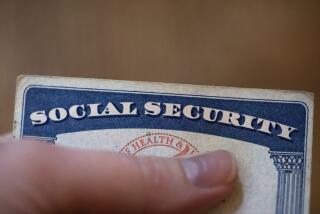Reagan Urges 4.1% Raise for U.S. Workers
SANTA BARBARA — President Reagan endorsed today a 4.1% pay increase for all but the most senior federal workers, placing the Administration in agreement with Congress on the pay raise plan.
In a letter to Congress, Reagan suggested that the raise, already approved by a House-Senate conference committee, become effective Jan. 1. Administration officials estimate the cost at $4 billion, to be offset by other savings by individual agencies.
Consistent with previous years, Reagan proposed the 4.1% figure as an alternative to what a federal advisory commission said would be needed to place federal employees on a par with what their counterparts in the private sector earn for comparable work.
Annual Computation
Under the Federal Pay Comparability Act of 1970, the Advisory Committee on Federal Pay is required each year to compute the increase that would be needed to achieve similar salaries between government and the private sector.
This year, the panel said that would require an overall increase of 26.28% in government pay. As he has in the past, Reagan concluded that economic conditions, especially deficit-reduction pressures, would not permit such a large raise and proposed 4.1% as a realistic alternative.
The pay raise would affect federal workers making up to $75,500 a year. It would not apply to members of Congress, the judiciary, the Cabinet or other top executive branch officials.
Civil Servants
The increase would cover civil servants from the entry-level GS-1 level, making $10,213 a year, to just below the GS-17 level of $76,990 a year. GS-17s and GS-18s would be excluded, as would be members of the three top levels of the Senior Executive Service, who now make $76,400 to $80,700 a year. Military pay is handled separately.
In his letter, Reagan said he regretted that the pay raise pending on Capitol Hill excluded members of the government’s Senior Executive Service, “since it is at the highest levels of the government’s pay system where federal pay lags most seriously behind private-sector pay.”
But, he said, “appropriate pay increases” for those senior public servants will be included in the final budget message he sends Congress in January before leaving office.
More to Read
Get the L.A. Times Politics newsletter
Deeply reported insights into legislation, politics and policy from Sacramento, Washington and beyond. In your inbox three times per week.
You may occasionally receive promotional content from the Los Angeles Times.










